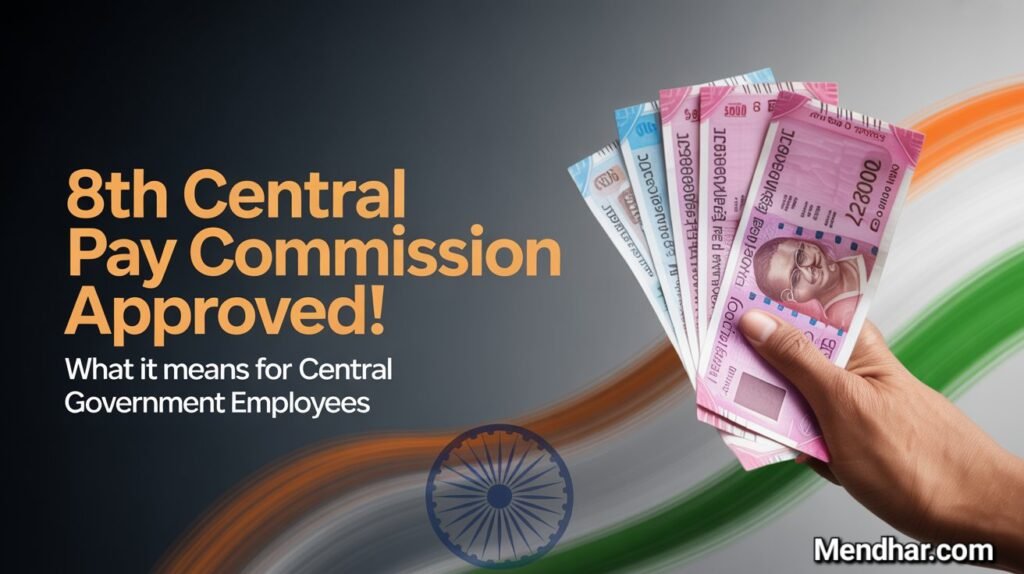
Table of Contents
ToggleThe Dawn of the 8th Central Pay Commission: A Significant Leap for Central Government Employees
The announcement of the 8th Central Pay Commission marks a landmark decision for central government employees across India. With its predecessor, the 7th Pay Commission, slated to serve from 2016 through 2026, the early establishment of the 8th Central Pay Commission demonstrates foresight, planning, and a commitment to ensuring continuity and fairness in compensation reforms.
In this blog, we explore the significance of the 8th Central Pay Commission, the rationale behind its early inception, and what it could mean for millions of central government employees. We will delve into the process, expectations, challenges, and the broader impact that the 8th Central Pay Commission could bring.
Official Announcement
Prime Minister has approved setting up an 8th Central Pay Commission for all central government employees. As you know, the Central Pay Commission has been instituted periodically since 1947. The Prime Minister has pledged to maintain a regular rhythm: the 7th Pay Commission began in 2016, and its term completes in 2026. By establishing the 8th Pay Commission well before 2025, there will be sufficient time to solicit recommendations in advance of the 7th Pay Commission's expiry.
This process involves massive consultations — with state governments, all stakeholders in the central government, and various Public Sector Undertakings (PSUs). The Commission's leadership — a Chairman and two members — will also be appointed. This is a major decision. Once the 7th Pay Commission is set, nearly every organization in the country tends to follow its recommendations. It is, therefore, a critical move for central government employees.
I wish you all a very happy Sankranti (festival).
Key Figures from Previous Commission
When the last Pay Commission was set up in 2016, it covered nearly 5 million central government employees in two categories.
Why an 8th Central Pay Commission?
1. Regular Rhythm and Predictability
From 1947 onwards, pay commissions have been instituted periodically to review salaries, benefits, and service conditions for central employees. The decision to maintain a regular rhythm underscores the government's commitment to structured governance and avoids ad-hoc or delayed revisions. The launch of the 8th Central Pay Commission ahead of time reflects this disciplined approach.
2. Time for Thorough Consultation
A central pay commission is not merely a top-down exercise. It requires massive consultations — with state governments, central ministries, PSUs, employee unions, and other stakeholders. By launching the 8th Central Pay Commission well before the end of the 7th pay cycle, the system ensures sufficient time to collect, deliberate, and refine recommendations without rushing.
3. Seamless Transition and Minimal Disruption
If the 8th Central Pay Commission's recommendations are finalized in time, they can be applied immediately after 2026, ensuring a seamless transition. This avoids gaps or uncertainty in pay structures, which is essential given how many institutions base their pay scales on central pay commission norms.
4. Nationwide Alignment
Once a Pay Commission report is accepted, it tends to become a benchmark for many organizations across India — state governments, autonomous bodies, PSUs, etc. The 8th Central Pay Commission will thus indirectly influence a vast ecosystem of employment and compensation norms across the country.
Process and Structure
Appointment of Leadership
The 8th Central Pay Commission will be headed by a Chairman and supported by two members. The selection of these leaders will be crucial, as they guide the commission through a complex terrain of issues, trade-offs, and stakeholder interests.
Stakeholder Consultation
To function effectively, the commission will hold hearings, receive written representations, and hold dialogues with state governments, central ministries, employee associations, PSUs, and academics. These inputs will shape not only salary scales but allowances, service conditions, pension norms, and more.
Timeline Management
Since the 7th Pay Commission's term ends in 2026, the 8th Central Pay Commission will need to deliver timely recommendations — ideally by 2025 — to allow for review, decision-making, and implementation. The early start builds a buffer against delays and controversies that often accompany such massive policy reforms.
Key Expectations from the 8th Central Pay Commission
1. Revision of Pay Scales & Basic Salary
One of the primary tasks will be to reassess pay bands and the basic salary structure, taking into account inflation, cost-of-living changes, and evolving public sector demands.
2. Allowances & Perks Revisit
Many allowances (e.g., house rent, transport, medical) need re-evaluation. The 8th Central Pay Commission is expected to rationalize overlapping allowances, enhance or retire outdated ones, and align them with contemporary needs.
3. Pension and Retirement Benefits
For retired personnel and future retirees, pension reform and benefits must be addressed carefully — ensuring sustainability while honoring past commitments.
4. Performance-Based Incentives & Career Progression
The commission may explore more liberal incentives, performance-linked pay, and clearer promotional pathways to boost morale and performance.
5. Equal Treatment Across Departments & Equity
One challenge is maintaining equity across diverse central departments and aligning pay differentials based on job complexity, risk, and responsibility.
Challenges Ahead
Balancing Budgetary Constraints
Any increase in pay or benefits has to be weighed against the fiscal capacity of the Union government. Striking a balance between employee welfare and budget prudence will be delicate.
Harmonizing Stakeholder Demands
With varied expectations from states, central ministries, PSUs, and employee unions, reconciling divergent voices will be a major task for the 8th Central Pay Commission.
Timely Execution
Delays in hearings, report drafting, or approval can delay implementation — hampering the very purpose of early formation.
Managing Legacy Liabilities
Past pay commission decisions may have created entitlements, back payments, or disparities. Reconciling those during a new commission's tenure will be tricky.
What This Means for Central Government Employees
Hope for Enhanced Compensation
The announcement of the 8th Central Pay Commission fuels optimism that improved pay scales, better allowances, and modernized benefits are in store.
Transparency & Participation
With a longer window for consultation, employees have a better chance to voice their concerns and suggestions — making the process more inclusive.
Certainty of Continuity
The planned transition from the 7th to the 8th Central Pay Commission ensures that central employees won't be stuck in limbo between pay revisions.
Trickle-Down Effects
Because many state institutions and autonomous bodies follow central pay norms, the influence of the 8th Central Pay Commission could benefit a broader swath of public servants beyond just central government employees.
Conclusion
The institution of the 8th Central Pay Commission ahead of schedule represents a forward-looking, strategic move by the government. It ensures that central government employees will have a well-structured, consultative process leading into the next era of compensation reforms. The success of the 8th Central Pay Commission will depend on timely execution, balanced recommendations, and effective stakeholder engagement. If all goes well, India's central employees can look forward to a new era of fairness, transparency, and enhanced remuneration.
Word Count: ~750

